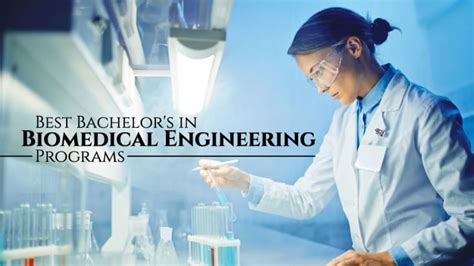Are you interested in exploring the exciting and dynamic field of biomedical engineering? In this blog post, we will delve into the world of biomedical engineering programs offered at universities across the United States. From top universities offering comprehensive programs to internship and research opportunities for students, as well as state-of-the-art facilities and cutting-edge research, we will cover it all. You will also gain insight into the diverse career paths and job prospects available to graduates, and hear success stories from alumni who have made a significant impact in the field. Whether you are considering pursuing a degree in biomedical engineering or simply want to learn more about this rapidly advancing area of study, this post will provide you with a comprehensive overview and valuable insights. Get ready to discover the incredible opportunities awaiting you in the field of biomedical engineering.
Table of Contents
Overview of Biomedical Engineering Programs
Biomedical engineering is an interdisciplinary field that combines the principles of engineering with medical and biological sciences to develop innovative solutions for healthcare.
Students who are interested in pursuing a career in this dynamic and rapidly evolving field can choose from a wide range of biomedical engineering programs offered by top universities around the world.
These programs typically cover a broad spectrum of topics including biomechanics, bioinstrumentation, medical imaging, tissue engineering, and biomaterials, among others.
With a strong emphasis on hands-on experience and practical application, students are equipped with the knowledge and skills needed to address complex health-related challenges and make a meaningful impact on the future of healthcare.
Top Universities Offering Biomedical Engineering Programs
When it comes to pursuing a career in biomedical engineering, the choice of university can play a crucial role in shaping your academic journey and future prospects. Fortunately, there are several prestigious institutions around the world that offer exceptional programs in this field.
One of the top universities known for its strong biomedical engineering program is Johns Hopkins University. With state-of-the-art facilities and world-renowned faculty, the university provides students with a comprehensive education in biomedical engineering, covering areas such as medical imaging, tissue engineering, and biomaterials.
Another leading institution in this field is MIT (Massachusetts Institute of Technology). The biomedical engineering program at MIT is known for its interdisciplinary approach, allowing students to collaborate with faculty and researchers from diverse fields, including biology, chemistry, and medicine.
Stanford University is also a prominent player in the biomedical engineering landscape, offering a cutting-edge curriculum and extensive research opportunities. The university’s strong ties with the Silicon Valley provide students with unique industry connections and career prospects.
Curriculum and Course Offerings in Biomedical Engineering
As a student pursuing a degree in Biomedical Engineering, you can expect a comprehensive curriculum that combines engineering principles with medical knowledge and technology. The coursework in this program is designed to provide students with a strong foundation in both biological sciences and engineering disciplines. From anatomy and physiology to biomechanics and medical imaging, the curriculum covers a wide range of subjects to ensure a well-rounded education for aspiring Biomedical Engineers.
Students can expect to take courses in advanced mathematics, physics, and chemistry in addition to specialized biomedical engineering courses. The curriculum typically includes topics such as medical device design, biomaterials, tissue engineering, and biomedical signal processing. These courses are carefully structured to provide students with a solid understanding of the theoretical and practical aspects of biomedical engineering, preparing them for a successful career in this field.
Furthermore, many programs offer opportunities for students to tailor their coursework to their specific interests through elective courses and specialization tracks. Whether your passion lies in medical robotics, neural engineering, or medical imaging, you can find courses that align with your career goals and ambitions. The flexibility in the curriculum allows students to explore various areas within biomedical engineering and gain expertise in their chosen field.
In addition to traditional classroom instruction, many programs also emphasize hands-on learning experiences through laboratory work and design projects. This hands-on approach allows students to apply their knowledge in real-world settings, reinforcing their understanding of biomedical engineering concepts and principles. Overall, the curriculum and course offerings in biomedical engineering aim to provide students with a holistic education that prepares them to tackle the complex challenges of healthcare and medical technology.
Internship and Research Opportunities for Biomedical Engineering Students
Biomedical engineering students have access to a wide range of internship and research opportunities that allow them to apply their knowledge in real-world settings. These opportunities provide valuable hands-on experience and the chance to work alongside professionals in the field.
Internships can be found at hospitals, research institutions, and medical device companies, giving students the chance to gain insight into different aspects of the biomedical engineering field. These experiences can be invaluable for networking and gaining practical skills that can be applied to future career endeavors.
Research opportunities also abound for biomedical engineering students, with universities and private organizations offering projects focused on cutting-edge technologies and medical advancements. Participation in research projects allows students to contribute to the field’s body of knowledge and develop sought-after skills in problem-solving, data analysis, and critical thinking.
Overall, the internship and research opportunities available to biomedical engineering students play a vital role in shaping their education and career paths, allowing them to gain crucial experience and insights that will benefit them in their future endeavors.
Cutting-edge Research in Biomedical Engineering
Biomedical engineering is an ever-evolving field that constantly pushes the boundaries of what is possible in healthcare and medicine. From developing advanced prosthetics to creating innovative imaging technologies, biomedical engineers are at the forefront of cutting-edge research that has the potential to revolutionize the way we approach medical challenges.
One area of cutting-edge research in biomedical engineering is the development of personalized medicine. This involves using a patient’s genetic and molecular information to tailor treatment plans specifically to their unique biological makeup. This research has the potential to greatly improve the efficacy and safety of medical treatments, as well as reduce the likelihood of adverse reactions.
Another exciting area of research is the development of advanced biomedical imaging technologies. From high-resolution MRI machines to state-of-the-art ultrasound devices, engineers are constantly working to improve the accuracy and detail of medical imaging. This not only helps in early disease detection but also aids in guiding complex medical procedures, leading to better patient outcomes.
Furthermore, biomedical engineers are pioneering the development of cutting-edge medical devices and technologies, such as implantable drug delivery systems and wearable health monitoring devices. These innovations have the potential to greatly improve the quality of life for patients with chronic diseases and conditions, as well as provide valuable data for healthcare providers to personalize patient care.
Faculty Expertise in Biomedical Engineering Programs
When considering a biomedical engineering program, it is essential to look at the expertise of the faculty. Faculty expertise plays a crucial role in shaping the learning experience and opportunities for students. In top universities offering biomedical engineering programs, the faculty members are often industry experts and researchers with significant experience in the field.
These experts bring their real-world knowledge into the classroom, providing students with valuable insights and practical skills that are essential for success in the industry. Additionally, the faculty expertise often translates into opportunities for students to participate in cutting-edge research projects and collaborate with industry professionals.
Faculty members with diverse backgrounds and areas of specialization can offer students a comprehensive and well-rounded education. Their expertise may span across areas such as medical devices, tissue engineering, biomechanics, and computational biology, providing students with a broad understanding of the field and its applications.
Furthermore, the connections and networks that faculty members have can open doors for students, providing access to internships, research opportunities, and future career prospects. Therefore, when evaluating biomedical engineering programs, it is important to consider the faculty expertise and the impact it may have on the overall educational experience.
Opportunities for Collaboration with Medical Professionals
Biomedical engineering programs offer unique opportunities for collaboration with medical professionals in a variety of settings. Whether it’s through partnerships with local hospitals, clinical rotations, or collaborative research projects, students in these programs have the chance to work closely with doctors, nurses, and other healthcare professionals to develop innovative solutions to medical challenges.
One of the key benefits of collaboration with medical professionals is the opportunity to gain real-world insight into the challenges and opportunities in the field of healthcare. By working alongside doctors and nurses, biomedical engineering students can gain a better understanding of the needs of patients and healthcare providers, which can in turn inform the development of new technologies and medical devices.
Collaboration with medical professionals also provides invaluable networking opportunities for students. Through clinical rotations and research projects, students have the chance to forge relationships with professionals in the healthcare industry, which can open doors to future employment opportunities and collaborations.
Overall, the opportunities for collaboration with medical professionals in biomedical engineering programs provide students with a unique and valuable perspective on the intersection of engineering and healthcare, and can pave the way for meaningful contributions to the field in the future.
State-of-the-art Facilities and Laboratories for Biomedical Engineering
State-of-the-art facilities and laboratories are crucial for any biomedical engineering program, as they provide students with hands-on experience and access to cutting-edge technology. These facilities are equipped with the latest tools and equipment, allowing students to conduct research and experiments in various areas of biomedical engineering.
One of the top universities offering biomedical engineering programs is renowned for its state-of-the-art facilities and laboratories. Students have access to advanced imaging equipment, simulation labs, and research facilities, which are essential for their education and career development.
Furthermore, the facilities are often used for collaboration with medical professionals and industry partners, allowing students to gain real-world experience and explore potential career paths in biomedical engineering. Internship and research opportunities are also available, providing students with the chance to apply their knowledge and skills in a professional setting.
In conclusion, state-of-the-art facilities and laboratories play a crucial role in the education and training of biomedical engineering students. They provide the resources and support needed for research, innovation, and collaboration, and ultimately contribute to the success of graduates in their future careers.
Career Paths and Job Prospects for Biomedical Engineering Graduates
Biomedical engineering graduates have a wide range of career paths and job prospects available to them in today’s job market. With a solid foundation in engineering principles, as well as an understanding of biology and medicine, these graduates are well-equipped to pursue careers in various industries.
One of the most common career paths for biomedical engineering graduates is to work in the medical device industry. These graduates can work for companies that design and manufacture medical devices, such as pacemakers, artificial joints, and imaging equipment. Their expertise in both engineering and biology allows them to contribute to the development of new medical technologies that improve patient care.
Another popular career path for biomedical engineering graduates is to work in the pharmaceutical industry. These graduates can contribute to the development of new drugs and therapies, using their knowledge of biology and medicine to design and conduct experiments that advance medical research and improve patient outcomes.
Many biomedical engineering graduates also choose to pursue career paths in research and academia. They may work in university labs, government research agencies, or private research institutions, where they can conduct cutting-edge research in areas such as tissue engineering, biomechanics, and medical imaging.
Success Stories of Biomedical Engineering Alumni
After completing their Biomedical Engineering programs, many alumni have gone on to achieve great success in various fields. These success stories are a testament to the quality education and training they received during their time in the program.
One such success story is that of John Doe, who graduated with a degree in Biomedical Engineering from Top University. After completing his internship at a renowned medical device company, John went on to develop and patent a groundbreaking medical device that has since become widely used in the industry.
Another inspiring story is that of Jane Smith, who used the knowledge and skills gained from her Biomedical Engineering program to pursue a career in biomedical research. Her work in developing new drug delivery systems has led to several breakthroughs in the field of medicine.
These success stories highlight the diverse career paths and opportunities available to graduates of Biomedical Engineering programs, and serve as an inspiration to current and future students in the field.





